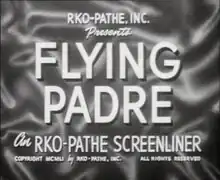| Flying Padre | |
|---|---|
 Title card from Flying Padre | |
| Directed by | Stanley Kubrick |
| Written by | Stanley Kubrick |
| Produced by | Burton Benjamin |
| Starring | Fred Stadmueller |
| Narrated by | Bob Hite |
| Cinematography | Stanley Kubrick |
| Edited by | Isaac Kleinerman |
| Music by | Nathaniel Shilkret |
| Distributed by | RKO Radio Pictures |
Release date | March 23, 1951 |
Running time | 9 minutes |
| Country | United States |
| Language | English |
Flying Padre is a 1951 short subject black-and-white documentary film. It is the second film directed by Stanley Kubrick. The film is nine minutes long and was completed shortly after Kubrick had completed his first film for RKO, the short subject Day of the Fight (1951). The studio offered him a follow-up project for their Screenliner series.[1]
Synopsis
The subject of Flying Padre is a Catholic priest in rural New Mexico, Reverend Fred Stadtmueller. Known to his parishioners as the "Flying Padre", his 4,000-square mile parish is so large, he uses a Piper Cub aircraft (named the Spirit of St. Joseph) to travel from one isolated settlement to another.
The film shows two days in his daily life, with the Reverend providing spiritual guidance, saying a Funeral Mass, and other glimpses of his life such as his breakfast routine at the parish house. His days include a funeral service for a ranch hand, and counseling of two young parishioners who have been quarrelling. In the climax of the film. the "Flying Padre" also operated as an impromptu air ambulance by flying a sick child and his mother to hospital.
Cast
- Bob Hite as himself - Narrator (voice)
- Reverend Fred Stadtmueller as himself
- Pedro as himself
Production
After Kubrick sold his first short film, the self-financed Day of the Fight, to RKO in 1951 for $4,000 (pocketing a $100 profit),[2] the company advanced the 23-year-old filmmaker money to make a follow-up project, a documentary short for their Pathe Screenliner series which specialized in short human-interest documentaries. He originally wanted to call the film Sky Pilot but the studio did not like the title.[1][3]
Reception
In an interview in 1969, Kubrick referred to Flying Padre as a "silly thing".[2] Flying Padre, however, was an important landmark in his budding career as a filmmaker. "It was at this point that I formally quit my job at Look to work full time on filmmaking," Kubrick stated in an interview."[1]
References
Notes
- ↑ Hite was an announcer and anchor for CBS from 1944-1979, during which time he was announcer for the CBS Evening News with Walter Cronkite. Prior to joining CBS, Hite was at WXYZ, Detroit, where he narrated the old radio shows such as The Lone Ranger, The Green Hornet, Sergeant Preston of the Yukon, and The Shadow.[4]
Citations
- 1 2 3 Stafford, Jeff. "Articles: 'Flying Padre' (1951)." TCM, 2019. Retrieved: June 13, 2019.
- 1 2 Gelmis, Joseph. "An Interview With Stanley Kubrick (1969), excerpted from The Film Director as Superstar, 1970, p. 293.
- ↑ "Stanley Kubrick: The Master Filmmaker - Biography/Chronology." prodigy.com, July 12, 2009.
- ↑ "Bob Hite (II)." IMDB, 2019. Retrieved: June 13, 2019.
Bibliography
- Gelmis, Joseph. The Film Director as Superstar. New York: Doubleday, 1970. ISBN 978-0-38502-229-3.
External links
- Flying Padre at IMDb
- Flying Padre at the TCM Movie Database
- Flying Padre at Kubrick: Master Filmmaker
- Flying Padre at Kubrick Multimedia Film Guide
- Flying Padre (Translated from French to English by Google)
- The Kubrick Site